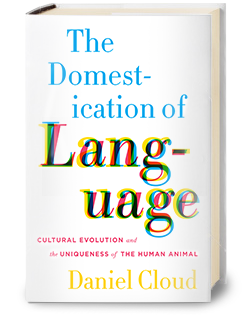December 16, 2014
Why is human language and culture so astoundingly complex? In order to prosper in the so-called “era of evolutionary adaptation,” neither needed to have been complex at all. A Hominin with a smallish fraction of the symbolic and cultural abilities of Homo sapiens would easily have emerged (and maybe did emerge) as a completely dominant alpha predator. Imagine, if you will, a chimp that could talk a bit and produce reasonably effective missile weapons. How much selection pressure would such a talking, armed chimp face? Not much, at least from other animals. Such an Hominin would not, ceteris paribus, need to evolve new and more complex linguistic and cultural abilities and forms.
But complex linguistic and cultural abilities and forms did evolve. So, we have to ask, where do Shakespeare and Large Hadron Colliders come from? Daniel Cloud has an answer: domestication. In his fascinating and thought-provoking new book The Domestication of Language: Cultural Evolution and the Uniqueness of the Human Animal, Cloud argues that over the millennia proto-humans and humans have been selecting mates who were good with symbols and selecting symbols themselves. This process – a kind of runaway sexual selection and domestication – rapidly (in evolutionary time-scales) produced both a huge, expensive brain and an ornate culture to match.
Listen the interview with Daniel Cloud and Marshall Poe, NewbooksNetwork.com – New Books in Big Ideas.

